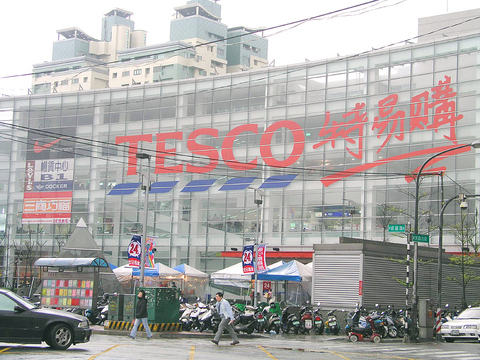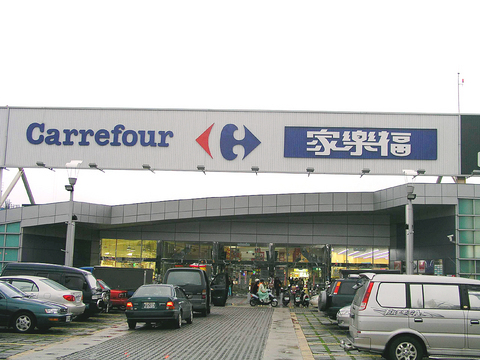Carrefour SA, the world's second-largest retailer, yesterday announced that it is taking over Tesco Stores (Taiwan) Co's six outlets and two development sites as part of an asset-swap deal with Tesco Plc in the UK valued at a total of 132 million euros (US$159 million).
In return, Carrefour will hand over its 11 outlets in the Czech Republic and 4 stores in Slovakia to the UK's biggest retailer at 189 million euros.
This is the first deal of its kind between two global retail groups. The swap reflects both companies' desire to focus on markets where they aim to become dominant players.

"It's hard to survive the fierce competition if you're not No. 1 or No. 2," Allan Tien (
"If you find yourself struggling hard to make headway in certain countries, why keep doing it? We're late in breaking into the Czech Republic and Slovakia, and Tesco faces the same situation in Taiwan. I think this new breakthrough will facilitate these two groups' healthy operations," he said.
The deal, which is currently pending approval by the nation's Fair Trade Commission, will boost Carrefour's market presence from 33 percent with 36 outlets nationwide to a promising 40 percent with 42 outlets, he said.

PHOTOS: YANG YA-MIN, TAIPEI TIMES
Tien promised that no job cuts will occur, as Carrefour Taiwan -- a joint venture between the company's Paris-based headquarters and Taiwan's Uni-President Enterprises Corp (統一企業) -- will accommodate all of its smaller rival's employees.
"As soon as the government approves the takeover, which might take around two months, we'll start replacing the store signs and product mix," which would mark the complete withdrawal of Tesco from the local market, he said.
Tesco chief financial officer Andrew Higginson said in an interview yesterday that the company's move into Taiwan was ill-timed, and its store openings were too slow.
The UK retailer entered the nation in 2000 with a relatively slow pace of store expansion compared with its stronger rivals, including Carrefour, which is still maintaining its policy of opening three to four stores in Taiwan every year.
"All the retailers have been spreading themselves too thinly abroad and now it's time for them to refocus on the areas where they're doing well," said Hilary Cook, director of investment strategy at Barclays Private Clients in London, which oversees the equivalent of about US$88 billion, including Tesco and Carrefour shares.
"Food retailing is all about economies of scale," he added.
Daisy Lee (
"Our operations and services will remain unchanged until the takeover procedure commences in several months. Consumers can still use their gift vouchers.
Carrefour, with about half of its 73 billion euros in annual sales coming from outside France, exited Mexico and Japan this year. Tesco, which is the biggest hypermarket operator in Slovakia, is bolstering its position in the country and neighboring Czech Republic.
Tesco's international sales climbed 17 percent at constant exchange rates in the 24 weeks ended Aug. 13. to ?4.2 billion pounds (US$7.4 billion). It makes about 30 percent of its sales overseas.
Higginson said Tesco had no plans to leave any other countries, nor for any other store-swap deals.

Sweeping policy changes under US Secretary of Health and Human Services Robert F. Kennedy Jr are having a chilling effect on vaccine makers as anti-vaccine rhetoric has turned into concrete changes in inoculation schedules and recommendations, investors and executives said. The administration of US President Donald Trump has in the past year upended vaccine recommendations, with the country last month ending its longstanding guidance that all children receive inoculations against flu, hepatitis A and other diseases. The unprecedented changes have led to diminished vaccine usage, hurt the investment case for some biotechs, and created a drag that would likely dent revenues and

Macronix International Co (旺宏), the world’s biggest NOR flash memory supplier, yesterday said it would spend NT$22 billion (US$699.1 million) on capacity expansion this year to increase its production of mid-to-low-density memory chips as the world’s major memorychip suppliers are phasing out the market. The company said its planned capital expenditures are about 11 times higher than the NT$1.8 billion it spent on new facilities and equipment last year. A majority of this year’s outlay would be allocated to step up capacity of multi-level cell (MLC) NAND flash memory chips, which are used in embedded multimedia cards (eMMC), a managed

CULPRITS: Factors that affected the slip included falling global crude oil prices, wait-and-see consumer attitudes due to US tariffs and a different Lunar New Year holiday schedule Taiwan’s retail sales ended a nine-year growth streak last year, slipping 0.2 percent from a year earlier as uncertainty over US tariff policies affected demand for durable goods, data released on Friday by the Ministry of Economic Affairs showed. Last year’s retail sales totaled NT$4.84 trillion (US$153.27 billion), down about NT$9.5 billion, or 0.2 percent, from 2024. Despite the decline, the figure was still the second-highest annual sales total on record. Ministry statistics department deputy head Chen Yu-fang (陳玉芳) said sales of cars, motorcycles and related products, which accounted for 17.4 percent of total retail rales last year, fell NT$68.1 billion, or

In the wake of strong global demand for AI applications, Taiwan’s export-oriented economy accelerated with the composite index of economic indicators flashing the first “red” light in December for one year, indicating the economy is in booming mode, the National Development Council (NDC) said yesterday. Moreover, the index of leading indicators, which gauges the potential state of the economy over the next six months, also moved higher in December amid growing optimism over the outlook, the NDC said. In December, the index of economic indicators rose one point from a month earlier to 38, at the lower end of the “red” light.